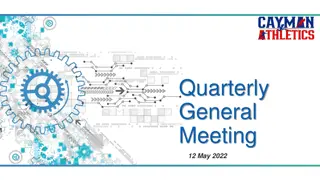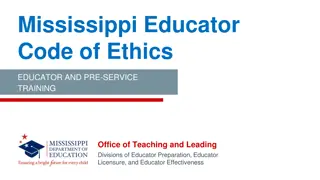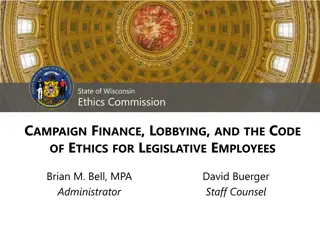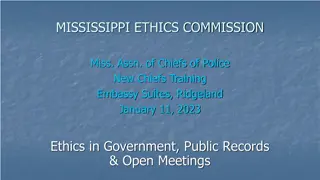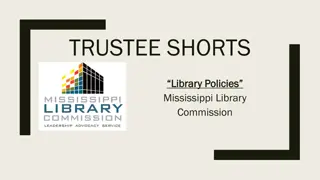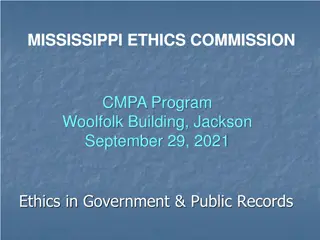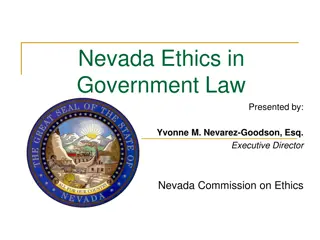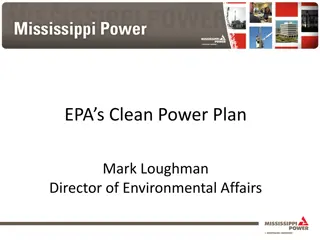Ethics in Government: Mississippi Ethics Commission Overview
The Mississippi Ethics Commission administers and enforces the Ethics in Government Law, ensuring statements of economic interest are kept, investigating violations, and advising on compliance. Members of public school boards must file statements annually, and a complaint process exists for alleged violations. Enforcement includes hearings, fines, and court appeals. Eight basic prohibitions outline acceptable behavior for board members. The constitution prohibits public officers from engaging in certain activities.
Download Presentation

Please find below an Image/Link to download the presentation.
The content on the website is provided AS IS for your information and personal use only. It may not be sold, licensed, or shared on other websites without obtaining consent from the author. Download presentation by click this link. If you encounter any issues during the download, it is possible that the publisher has removed the file from their server.
E N D
Presentation Transcript
MISSISSIPPI ETHICS COMMISSION Miss. School Boards Assn. Basic Course for New School Board Members MSBA Office, Ridgeland March 25, 2022 Ethics in Government Law and Open Meetings Act
MISSISSIPPI ETHICS COMMISSION Administers and enforces the Ethics in Government Law by Keeping Statements of Economic Interest; Investigating alleged violations of law; Issuing written advisory opinions. The Commission also enforces the Open Meetings Act and Public Records Act The Commission also issues advisory opinions on the Campaign Finance Law and levies fines for late filing of campaign finance reports.
ETHICS IN GOVERNMENT LAW
Statement of Economic Interest (SEI) Members of all public school boards must file, whether elected or appointed. Candidates for elected office and persons appointed to fill a vacancy in an elected office must also file. Incumbents must file before May 1 every year. Must be filed electronically on Ethics Commission web site. System saves information from previous year. If your information has not changed, you simply review it, and click a few buttons to refile.
Complaint Process Sworn complaint must be filed alleging a violation of law by a public servant before an investigation can be conducted. If investigation is authorized by Commission, it is conducted before respondent is notified. Respondent has 30 days to file a response. All investigative proceedings and records are strictly confidential, and breach of confidentiality constitutes a crime.
Enforcement Commission will hold hearings to determine guilt and to impose penalties. Appeals go to Hinds County Circuit Court. Commission can impose fines up to $10,000, order public servant to repay all money received, and order equitable remedies. Commission can recommend that Hinds County Circuit Court remove an official or suspend or demote an employee
Eight Basic Prohibitions Board Member Contracts Use of Office Contracting Purchasing Goods and Services Purchasing Securities Insider Lobbying Post Government Employment Insider Information
Section 109, Miss. Constitution of 1890 No public officer or member of the legislature shall be interested, directly or indirectly, in any contract with the state, or any district, county, city, or town thereof, authorized by any law passed or order made by any board of which he may be or may have been a member, during the term for which he shall have been chosen, or within one year after the expiration of such term.
Section 109, Miss. Constitution of 1890 Section 109 only applies to members of boards and the Legislature. There must be some sort of contract but does not have to be a written contract. The conflict arises when the board funds or otherwise authorizes the contract. Even if the individual member does not vote, he or she may be in violation. Notice the prohibition is against an interest, not against an act. The prohibition continues until a board member has been out of office for one year.
Advisory Opinion 17-080-E The spouse of a school board member may not be employed as a substitute teacher by a company which contracts with the school board to provide substitute teachers to the school district. The school board member would have a prohibited interest in the contract in violation of Section 109 and Section 25-4-105(2).
Advisory Opinion 13-024-E A school board member may have an interest in a Sixteenth Section lease only when the lease was authorized before the school board member took office, and the school board will take no action on the lease during the board member s term or for one year thereafter.
Advisory Opinion 17-025-E A business partially owned by a school board member may not serve as a vendor to the school district. Section 109 and Section 25-4- 105(2) prohibit a school board member from having a direct or indirect interest in any contract which is funded or otherwise authorized by the school board during that board member s term or for one year thereafter.
Section 25-4-105(1) (1) No public servant shall use his official position to obtain, or attempt to obtain, pecuniary benefit for himself other than that compensation provided for by law, or to obtain, or attempt to obtain, pecuniary benefit for any relative or any business with which he is associated.
Section 25-4-105(1) The statute does not require a public servant misuse his or her position. To avoid a violation, a public servant must totally and completely recuse himself or herself from the matter giving rise to the conflict. A board member must leave the board meeting before the matter comes up for discussion, may only return after the matter is concluded, and must not discuss the matter with anyone. An abstention is considered a vote with the majority and is not a recusal. The minutes of the meeting should accurately reflect the recusal. Recusal does not prevent other violations.
Section 25-4-105(1) Relative is the public servant s spouse, child, parent, sibling (brothers and sisters) or spouse of a relative (in-laws).
Advisory Opinion 10-035-E A school board member whose financially independent relative is employed by the school district may not participate in discussions and actions approving the annual school district budget. Only when a board member s recusal would result in the loss of a quorum and render the board unable to act may board member participate in approving district budget.
Advisory Opinion 14-028-E If new school board member and sibling are indeed financially independent, then sibling can remain employed by district and no violation of Section 109 or Section 25- 4-105(2) should occur, but the board member must recuse himself or herself from any matter which would result in a pecuniary benefit to the relative, in compliance with Section 25- 4-105(1).
Section 25-4-105(1) Business with which he is associated means public servant or his relative is officer, director, owner, partner, employee holder of more than ten percent (10%) of the fair market value or from which he or his relative derives more than $2,500 in annual income or over which such public servant or his relative exercises control.
Advisory Opinion 10-006-E A member of a school board may also serve as an officer of a Parent Teacher Organization (PTO) within the same school district. So long as the PTO is not receiving any funds from the district, no violation of Section 109 or Section 25-4-105(2) should arise. But the school board member must fully recuse from any action which would result in a pecuniary benefit to the PTO in compliance with Section 25-4-105(1).
Subsection (3)(a) The Contractor Prohibition (3) No public servant shall: (a) Be a contractor, subcontractor or vendor with the governmental entity of which he is a member, officer, employee or agent, other than in his contract of employment, or have a material financial interest in any business which is a contractor, subcontractor or vendorwith the governmental entity of which he is a member, officer, employee or agent.
Advisory Opinion 14-008-E A business owned by a school teacher may not serve as a contractor to the school district which employs the teacher. Section 25-4- 105(3)(a) prohibits a teacher from having a material financial interest in a business that serves as a contractor to his or her own school district.
Advisory Opinion 11-054-E School district employees may be assigned additional duties and paid additional compensation. While they cannot hold two separate positions with the same district, one may accept additional duties and receive additional compensation without violating Section 25-4- 105(3)(a) if paid under one contract.
Subsection (3)(b) The Purchaser Prohibition (3) No public servant shall: (b) Be a purchaser, direct or indirect, at any sale made by him in his official capacity or by the governmental entity of which he is an officer or employee, except in respect of the sale of goods or services when provided as public utilities or offered to the general public on a uniform price schedule.
Section 25-4-105(4) Exceptions to Subsection (3) These exceptions only apply to Subsection (3) and not to any other provisions of law. Can apply to a government employee but does not protect a board member from a violation of Section 109 or Section 25-4- 105(2). The employee would still have to recuse himself or herself from any action which might otherwise violate Section 25- 4-105(1).
OTHER LAWS Not part of Ethics Law but do relate to schools.
37-9-17: Step-Aside in Hiring Principal or superintendent cannot recommend employment of relative. Board may designate someone else to recommend relative. Cannot be used for central office staff. Limited to 2 jobs per school. Noninstructional employee must have been previously employed and cannot be paid more than statewide average.
Advisory Opinion 17-004-E The superintendent may not recommend a relative for continued employment, and the step-aside provision set out in Section 37-9-17 does not apply to employees of the central office.
Advisory Opinion A school superintendent s siblings may be employed as a principal or counselor in the same district. If the school board s designee recommends a superintendent s siblings and the superintendent fully and completely recuses himself or herself from the hiring and supervision process, then the superintendent does not violate Section 25-4-105(1). 14-039-E
37-9-21: School Nepotism Cannot hire licensed employee if related within third degree to majority of board. Board member cannot vote on licensed employee related within third degree. Contract is null and void if it violates this statute.
37-7-333: Bank Contracts If school board member has connection to a bank which bids on depository contract, then don t open any of the bids. Superintendent sends all sealed bids to state treasurer, who opens bids and selects depository.
Section 210, Miss. Constitution No superintendent, trustee or teacher may have any interest in the sale of anything to any public school in the state.
OPEN MEETINGS Enforcement Complaint is filed with Commission. Complaint is sent to public body, which can respond. Commission may dismiss complaint, make preliminary finding or hold a hearing. Ethics Commission may order public body to comply with law. Ethics Commission may impose $500 fine for first offense, $1,000 for subsequent offense. Ethics Commission can mediate disputes. Either party may appeal de novo or enforce Ethics Commission order in local chancery court.
OPEN MEETINGS ACT The Basics Public meetings must be open to public. Executive session must follow specific procedure and only for certain reasons. Notice of meeting must be given, and minutes must be kept. Social gatherings are not meetings unless official business is discussed. Act never requires executive session.
Columbus v. Commercial Dispatch Miss. Sup. Ct.; Sept. 7, 2017 Deliberations of a quorum must take place in a proper public meeting. When a quorum splits into separate groups and discusses the same matter of city business with the same person, a quorum is deliberating, and a meeting has occurred.
Case No. M-12-020 McGovern vs. Starkville Retreats conducted by the Board of Aldermen are meetings subject to the Open Meetings Act Even if no official action is taken at a meeting, minutes must be kept Committees established by the board to conduct business of the city are subject to the Open Meetings Act
Case No. M-17-012 Neely vs. Yazoo County CVB Email exchange among a quorum of a board about a matter under their authority can violate the Open Meetings Act. A quorum of a board should deliberate board business ONLY in a properly noticed public meeting. Board members should avoid using email to communicate with each other about board business.
Telephonic Meetings Section 25-41-5 All members can participate by phone. They can be in different locations, so long as one location is open to the public. Equipment (speaker phone) must be located in place where board normally meets and allow members of board and public to hear deliberations. Votes must be clearly audible or visible to members of the board and public.
Open Meetings Act and COVID-19 Statement posted at www.ethics.ms.gov Follow all public health recommendations. Comply with the Open Meetings Act as best you can. Take all measures within your means to ensure transparency AND protect public health. Use teleconference or videoconference. Equipment used should be located in public meeting place and should allow members of the board AND members of the public to hear deliberations. Record the open portion of meetings and make recordings available to the public. Agenda must be made available to the public at the time of the meeting via internet or social media.
EXECUTIVE SESSION PROCEDURE
Hinds County Bd. v. Common Cause (1989) The purpose is to discourage private meetings of public bodies . The technical requirements of the Act not only enlighten the public that there exists a specific, valid reason for going into executive session, but also make it somewhat onerous and time consuming for the board to do so. A board required by law to follow the procedure of 25-41-7 will no doubt be less inclined to go into executive session . [551 So.2d 107, 112]
Executive Session Procedure: Hinds County Bd. of Sup. v. Common Cause, 551 So.2d 107, 110-111 (Miss. 1989). 1. The meeting must begin as an Open Meeting. Miss. Code Ann. 25-41-7(1). 2. A member must make a motion for the meeting to be closed to determine whether or not the Board should declare an executive session. The statute does not require a second to this motion, but the vote on this motion is taken in open meeting. If majority votes to close meeting to make determination on the question of executive session, the meeting is closed for this purpose. Miss. Code Ann. 25-41-7(2).
Executive Session Procedure (continued) 3. No other business during this closed interim shall be considered until a vote has been taken on whether or not to declare an executive session. Miss. Code Ann. 25-41-7(2). In order to go into executive session, a majority of three-fifths of those present must vote in favor of it. Miss. Code Ann. 25-41-7(1). 4. The Board must then state in open meeting the reason for going into executive session, and this reason and total vote thereon must thereafter be recorded on the minutes of the meeting. Miss. Code Ann. 25-41-7(3), (5). 5. The vote to go into executive session is applicable only to that particular meeting on that particular day. Miss. Code Ann. 25-41-7(6).
EXECUTIVE SESSION REASONS
Announce Specific Reasons Reasons for executive session must be announced in open meeting and recorded in minutes. Must state a meaningful reason with sufficient specificity so that audience will later be able to check it out. To simply say, personnelmatters, or litigation, tells nothing. The reason stated must be of sufficient specificity to inform those present that there is in reality a specific, discrete matter or area which the board had determined should be discussed in executive session. Hinds County Board of Supervisors v. Common Cause of Mississippi, 551 So.2d 107, 111 (Miss. 1989).
Executive Session Reasons Executive session may be held for these reasons only: (a) Personnel matters relating to person in specific position (b) Litigation, where open discussion would have detrimental effect on litigating position (c) Security matters (d) Investigations regarding misconduct or violations of law (e) Legislature may enter executive session for any reason (f) Extraordinary emergency posing irrevocable harm (g) Prospective purchase, sale or leasing of lands (h) School board discussions about problems of students, parents or teachers (i) Preparation of professional licensing exams (j) Location, relocation or expansion of a business (k) Budget matter which may lead to termination of employee (l), (m) (n) certain PERS investments and hospital matters
OPEN MEETINGS ACT Notice Times and places of regular meetings should be set in minutes. (no statute) For recess, adjourned, interim or special meetings, notice must be posted in building where board normally meets within one hour of calling the meeting. Copy of the notice must be placed in the minutes.
Minutes Minutes must be kept for all meetings, whether in open or executive session. Minutes must be recorded within 30 days after meeting. Minutes must be available for public inspection.






